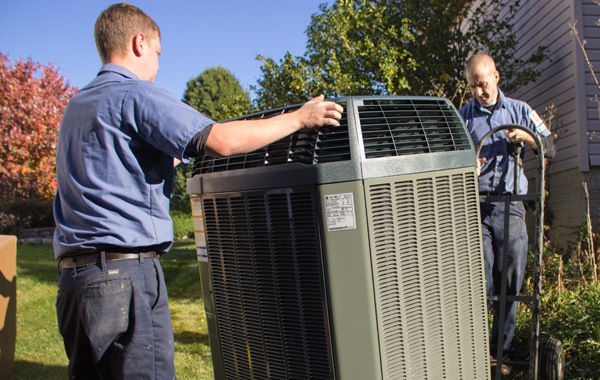

Author:
Revised:
January 4th, 2024
As HVAC professionals, we try not to focus too much on cost. It’s part of any conversation about new HVAC equipment, sure. But it’s also only one part of the equation, with the other side being the long-term comfort in your home.
But let’s be honest: cost matters. So does cost savings.
So I want to be clear from the start that there are other considerations that should be taken into account when you’re considering a new air conditioner. But this article is going to focus on the question of how much you can expect to save with a brand new AC unit.
First, you should familiarize yourself with How Much an AC Costs. But the sub-question behind total cost, the one we’ll be covering here, is “how much will that new AC save me?”
Because this article is being read by thousands, and because a lot changes from home to home, there won’t be an exact number. But we’re going to give you the tools and information to be able to approximate your savings in a way that can inform a smart HVAC purchase.
Will a New AC Save Me Money?
If you have an older or poorly performing air conditioner, the easy answer is that yes, a new AC will save you money. Often a lot of money, actually.
But that’s not the real question. Sure, your utilities will likely be lower month-to-month, but if you’re considering two options, and one is $5,000 and the other is $7,000, will you make back that $2,000 difference in cost savings to be able to justify the more expensive option.
The answer to that question is “sometimes.” But the good news is, we can often figure out if the answer will be a more confident “yes” or “no” depending on your particular circumstances.
SEER Savings by Rating
SEER Rating stands for Seasonal Energy Efficiency Ratio and is a handy acronym that represents your air conditioner’s efficiency. Modern air conditioners start at 13-14 SEER and go up to 20+ in the most advanced units.
The graphic below shows approximate cost savings on cooling your home, based on different SEER ratings.

You’ll notice that the graph goes below the 13-14 SEER that I said modern ACs start at. That’s because older air conditioners were often only 8-10 SEER at the time of installation. Even worse, since some equipment breaks down and loses efficiency over time, chances are your 8-10 SEER AC is actually operating at an even lower level.
This is where we start to get into some concrete numbers, but they’re still only in terms of percentages. The next step is to drill down another level to approximate your savings.
Calculating Cost Savings in HVAC Utilities
Your electric bill will include cooling costs, but it’s not only cooling costs. So if you’ve calculated, say, a 60% cost savings on cooling from the SEER graphic above, that’s only going to be 60% less on part of your total utilities, which will include other uses of electricity in the home.
During the summer, cooling will generally be the majority of your overall utility bill. But even then, it won’t represent the entire bill.
This is where the math becomes a little bit trickier, and it’s also why you won’t find an HVAC sales professional who will guarantee that you’ll save a certain amount per year. What if your utility bills are $500 lower this year, but next year we have an extremely long, hot summer season? You’ll still be operating with a much more efficient system, but your total cost may increase because of the weather.
Other variables will vary from home to home. Many have transitioned to work-from-home careers in recent years, for example. This can increase the usage of an HVAC system year-round because someone is home more often and using the system.
Other times, the price of utilities will increase, which means you’re running more efficiently but your bills look the same due to inflation.
The larger point, though, is that if a certain percentage of savings on cooling will cut your utilities dramatically, this will be true regardless of things like inflation and total usage.
A good HVAC contractor can help you approximate these savings, to help you decide if an upgrade in SEER will be worth it for you.
Stay Length and Geographic Location
These are two important factors that deserve their own little section.
ONE: How long do you plan on staying in your current home? This is often the entire difference between an entry-level air conditioner being best for you, and a top-of-the-line air conditioner being best for you.
On average here in Central Ohio, we find that people will save in the long-term with more advanced equipment if they stay in the home for 7-9 years or more. But this can vary based on usage. This also leads us to our second question...
TWO: Where do you live? This matters a ton for usage rates. We serve the Columbus, OH metro area, but we talk to people across the country. If you’re in the Southern US and use your air conditioner 8-9 months out of the year, you’ll see those cost savings add up much more quickly than in a household that only turns on their AC for 3-4 months out of the year.
The Perks of Variable-Speed Equipment
One of our installers told me that if you’re going to be in a home for more than about 5 years, there’s no reason to get anything except a variable-speed air conditioner.
While everyone’s situation is different, I believe there’s some truth to that statement.
Variable-speed equipment is the high-end of air conditioner technology. It allows for a lot of flexibility in how you cool your home, which translates to extra comfort and extra cost savings.
For those spending less than 5 years in a home, though, but who still need a new AC, variable speed is a more expensive option. And that’s because a home generally won’t start seeing the cost savings until years 5-10 (and certainly at 10+).
The initial cost can scare some people away, and if it won’t fit into your budget, that can be a valid concern. However, as I talk about toward the end of this article, there are some ways to help fund and finance variable-speed equipment to help you achieve those long-term cost savings.
Whole-Home Dehumidifiers: Boost Your Efficiency
What is the primary purpose of an air conditioner?
Some may respond, “to cool your home.” That’s not wrong, but arguably the most important task of an air conditioner is one we forget about.
Its task is to dehumidify your home. Without that, cooling can’t occur.
Whole-home dehumidifiers can run over $3,000, so it feels like a luxury to many homeowners. But that same question of how long you expect to stay in your home can reframe a dehumidifier as something that represents an opportunity to save money.
The other misconception about whole-house dehumidifiers is that they only dehumidify your basement. This isn’t true. In fact, by dehumidifying the basement, it extends to the entire home, which increases your comfort in ANY room of the house.
And since this is an article about cost savings, it’s worth pointing out that a whole-home dehumidifier will reduce the burden on your air conditioner, and therefore represents an opportunity to save in the long term.
If you don’t have a basement or live in a dry climate, you likely won’t ever need one. But for many with damp basements and/or in humid environments, it can be a life-saver.
RELATED: Is a Whole-Home Dehumidifier Right for Me?
Realizing Your Air Conditioner Savings
The moment of truth comes with budgeting for this. Extra savings over the next 10 years are great, but it means nothing if the initial cost is outside of your budget for the project.
This is where financing comes in. It’s designed to help people find the right way to get the best system for them.
What does that mean in terms of nuts & bolts? It could mean one of a handful of things:
- We have 0% financing for up to 72 months for those who qualify. This gives many homeowners peace of mind with an extended cushion for payments.
- We have other financing plans that offer a low-interest rate, but in doing so we’re able to lower the monthly payments. If you’re on a strict monthly or yearly budget, this can often help to fund a project.
- Some sophisticated equipment will come with opportunities for utility company or tax incentives. The details vary based on brand, model, and what offers are available, but your HVAC contractor can advise you on each of them.
At Fire & Ice, we don’t want to sell you a particular model. We want you to have the best fit for your life. Sometimes that means our cheapest option, and other times it means a top-of-the-line model with all the bells & whistles you could imagine.
Wherever you fall on that spectrum, we can help you determine which is best. And just as importantly, we can help you get the most comfort and savings from your system over the next 5, 10, or 20+ years.
When you’re ready to have that conversation, get started below by typing in your zip code. We’re looking forward to meeting with you!







